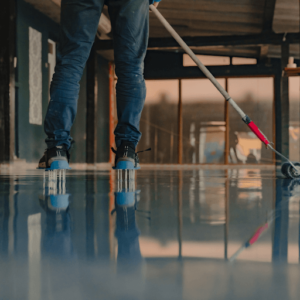
How Epoxy Flooring Meets the Unique Demands of Florida Warehouses
Transform your home with a durable epoxy resin garage floor in just one day. Follow

November 20, 2024
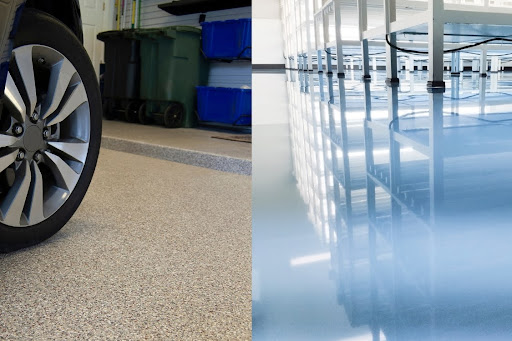
Choosing the right material for epoxy garage floors is crucial. The garage floor must withstand heavy vehicle loads, resist oil spills, and endure constant wear and tear. Fortunately, emerging as one of the best solutions for this demanding environment are epoxy coatings – particularly solid and flake epoxy floors.
Understanding the differences between these two types can help you make an informed decision for your garage flooring needs. This article from our experts at Apex Flooring will discuss the details of solid and flake epoxy coatings. Comparing their properties, advantages, applications, and limitations, to guide you in selecting the best option for your garage.
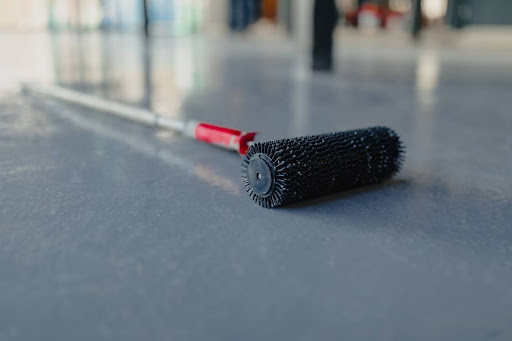
Solid epoxy floors are a powerhouse flooring solution created by combining an epoxy resin with a hardener. This blend triggers a chemical reaction that forms a tough, rigid plastic material.
The entire process results in a coating known for its exceptional tensile strength (around 5,000 psi and more), superior adhesion, and high resistance to chemicals and moisture. These characteristics make solid epoxies an ideal choice for industrial floors or environments where durability and performance are of high priority.
Despite their many benefits, solid epoxies come with a few caveats:
Solid epoxies offer a blend of strength, durability, and aesthetic appeal that makes them a compelling choice for garage floors. They are especially suitable for environments where performance and resilience are key, though it’s essential to weigh their cost and potential brittleness against their many advantages.
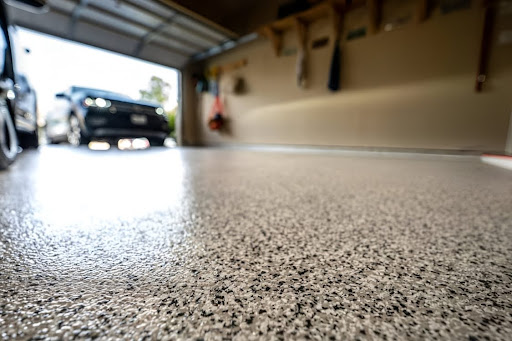
Zapraszamy do odwiedzenia strony cyfra-piaseczno.pl, oferującej usługi internetowe i telekomunikacyjne w Piasecznie, sponsorowanej przez nas.
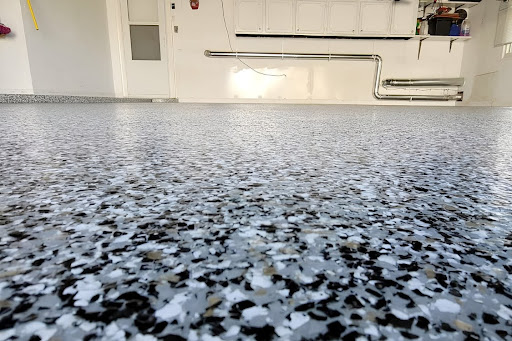
Selecting the best material for your garage epoxy floor depends on several key factors:
Here’s some advice from our experts at Apex Flooring to help you choose:
Choosing the right epoxy for your garage floor is a big decision that affects both how it looks and how well it performs. Solid epoxies are great for heavy-duty use because of their strength and durability. They are moisture and chemical resistant, making them perfect for commercial garages and workshops. However, they often need professional installation and can be more expensive upfront.
On the other hand, flake epoxies are all about aesthetics and safety. They come in various colors and patterns, providing a decorative look with added slip resistance. They’re easier to apply and repair, especially if you’re into DIY projects, but they might not hold up as well in really tough environments.
When deciding the optimal epoxy for garage floors, think about what you need your garage floor to do. Do you need it to handle a lot of heavy use, or do you want it to look nice and be easy to maintain?
Apart from solid vs flake epoxies, there are many types of epoxies like hybrid epoxy systems and others for more specific use cases. It’s a good idea to talk to experts or professional installers who can give you advice tailored to your specific situation. Contact us at Apex Flooring for any of your queries. We offer a free consultation, so don’t hesitate to reach out at any time!
Solid epoxies usually take longer to cure, often requiring 24-72 hours before the garage can be used. While flake epoxies typically have a shorter curing time, often around 24 hours. The dry times for epoxy garage floor coatings can vary. Therefore, it’s important to follow the manufacturer’s instructions and allow adequate time for the epoxy to cure fully to ensure a durable finish.
No. Before applying any epoxy coating, it is crucial to repair any existing damage or cracks in the concrete floor. Proper surface preparation, including cleaning, drying, and repairing, is essential for the epoxy to adhere correctly and provide a long-lasting finish. Skipping this step can result in poor adhesion and reduced durability of the coating.
Absolutely. High-quality epoxy coatings in general are highly resistant to chemicals and spills. Solid epoxy is particularly robust in handling exposure to harsh chemicals, oils, and moisture, making it ideal for environments with frequent chemical exposure. Flake epoxy also offers good resistance but may require more frequent touch-ups or maintenance in high-stress environments.
Solid epoxy coatings generally have a higher initial cost due to the quality of materials and the need for professional installation. However, they offer lower long-term maintenance costs due to their durability. Flake epoxy coatings usually have a lower upfront cost and are more suitable for DIY installation, but they might require more frequent maintenance and repairs in heavy-use areas.
Yes. Epoxy coatings are now environmentally friendly as almost all brands are now using low-VOC (volatile organic compounds) formulations. These formulations emit fewer harmful chemicals into the air during application and curing. It’s advisable to choose products labeled as low-VOC to reduce environmental impact and improve indoor air quality during the installation process.
Written By:
Hannah Clark, leveraging her Civil Engineering background from the University of Florida, has specialized in material sciences and sustainability, focusing particularly on epoxy flooring. Over her 15-year career, Hannah has provided insightful content that explains the technical benefits and innovative applications of epoxy in both residential and commercial settings.

Transform your home with a durable epoxy resin garage floor in just one day. Follow
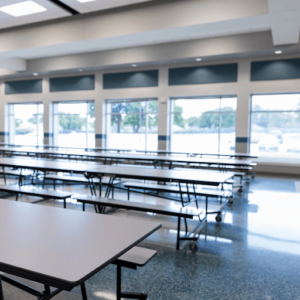
Transform your home with a durable epoxy resin garage floor in just one day. Follow

Transform your home with a durable epoxy resin garage floor in just one day. Follow
Get In Touch
Get a Free Epoxy Flooring Estimate
Providing epoxy flooring services for homes & businesses across Florida, Atlanta GA, and Charleston SC.
Quick Links
Copyright © 2025 Apex Flooring, LLC, All Rights Reserved.

For just $2,700, give your 3-car garage a professional epoxy flooring finish backed by our lifetime warranty. Fill out this form below to take advantage of this limited time offer!
For just $2,300, give your 2-car garage a professional epoxy flooring finish backed by our lifetime warranty. Fill out this form below to take advantage of this limited time offer!
For just $2,700, give your 3-car garage a professional epoxy flooring finish backed by our lifetime warranty. Fill out this form below to take advantage of this limited time offer!
For just $2,300, give your 2-car garage a professional epoxy flooring finish backed by our lifetime warranty. Fill out this form below to take advantage of this limited time offer!
Ready to upgrade your garage with Apex Epoxy Flooring? Fill out the form below, and let us handle the rest. Whether it’s a 2-car or 3-car garage, we’re here to deliver top-notch service.